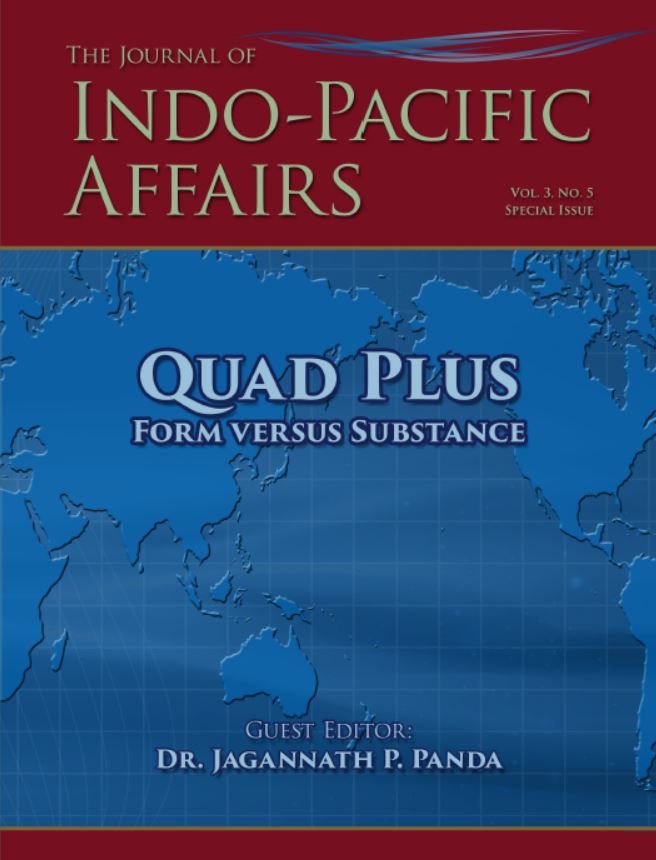France’s Indo-Pacific Strategy and the Quad Plus

In France, the launch of the Quad Plus raised little attention.
The emergence of yet another minilateral framework in the Indo-Pacific attracted some interest but also raised many doubts about the sustainability of this initiative. The general impression was that this new grouping was quite heterogeneous and maybe not the most relevant to tackle the challenge it ambitioned to address: the COVID-19 crisis. So, while it might be too soon to tell if Paris would be ready to join such a scheme, the examination of France’s various engagements in the Indo-Pacific can provide some clues regarding the synergies or divergences with the Quad Plus initiative.
In 2018, Paris unveiled its own Indo-Pacific strategy. It reflects a strategic reassessment of the region for French interests: the area is now widely acknowledged as the world economic powerhouse, and major trade partners are located there. The Indo-Pacific is also a key region when it comes to the governance of the commons and multilateralism. At the same time, there is now a recognition that China’s rise is increasingly challenging French interests in the region. Maritime security is a core interest and objective in developing an Indo-Pacific approach. The Indo-Pacific terminology serves to highlight the strategic dimension of France’s comprehensive approach to the region, by providing it with a powerful narrative. This narrative also strengthens Paris’s legitimacy to act in the area and is useful to develop and expand cooperation with like-minded partners. Through its Indo-Pacific strategy, France can thus more adequately protect its sovereign interests while promoting and advancing its very own vision for a balanced, multipolar, inclusive Indo-Pacific regional order, upheld by key liberal principles and multilateral schemes.
The French Indo-Pacific vision relies on key strategic partnerships with all the members of the Quad. However, a concern to keep its strategic autonomy in the context of a worsening US–China rivalry and the strong interest to coordinate with European partners in the Indo-Pacific explain why Paris would be reluctant to join the Quad Plus in its current form. Paris would certainly favor minilateral or multilateral initiatives in which France would find more aligned interests and retain greater autonomy, as well as a deepening of the bilateral relations with the members of the Quad Plus and ad hoc coordination on specific issues.
> Read the whole article on the website of the Journal of Indo-Pacific Affairs.

Available in:
Regions and themes
Share
Related centers and programs
Discover our other research centers and programsFind out more
Discover all our analyses
RAMSES 2024. A World to Be Remade
For its 42nd edition, RAMSES 2024 identifies three major challenges for 2024.

France and the Philippines should anchor their maritime partnership
With shared interests in promoting international law and sustainable development, France and the Philippines should strengthen their maritime cooperation in the Indo-Pacific. Through bilateral agreements, expanded joint exercises and the exchange of best practices, both nations can enhance maritime domain awareness, counter security threats and develop blue economy initiatives. This deeper collaboration would reinforce stability and environmental stewardship across the region.

The China-led AIIB, a geopolitical tool?
The establishment of the Asian Infrastructure Investment Bank (AIIB) in 2016, on a Chinese initiative, constituted an attempt to bridge the gap in infrastructure financing in Asia. However, it was also perceived in the West as a potential vehicle for China’s geostrategic agendas, fueling the suspicion that the institution might compete rather than align with existing multilateral development banks (MDBs) and impose its own standards.
Jammu and Kashmir in the Aftermath of August 2019
The abrogation of Article 370, which granted special status to the state of Jammu and Kashmir (J&K), has been on the agenda of the Bharatiya Janata Party (BJP) for many decades.









